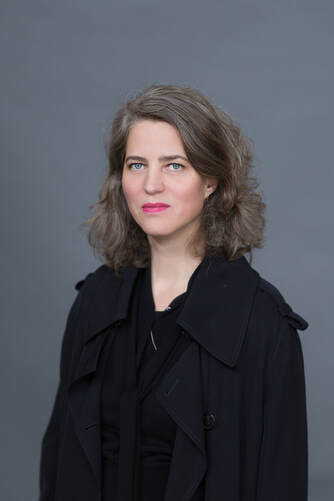|
Theater and Democracy
A talk with Prof. Dr. Juliane Rebentisch Sunday, June 2, 2019 at 18:00 |
المسرح والديمقراطية
محادثة مع بروفيسور دكتور جوليان ربينتيش يوم الأحد, 2 يونيو 2019, الساعة 18:00 |
תיאטרון ודמוקרטיה
שיחה עם פרופ' ד"ר ג'וליאן רבנטיש יום ראשון, 2 ביוני 2019, בשעה 18:00 |
|
*The talk will be held in English
The talk will critically discuss the underlying model of democracy as well as its traces in the contemporary worlds of theater and art. Political theories of the twentieth and twenty-first centuries are still influenced by a Rousseauian reservation against the theater. They all do not only share the diagnosis that the theatricalization of the political threatens the life of the polity; they also concur in the claim that the true essence of democracy is fulfilled in a commonality of action that would have overcome the division of the political space into hypocritical actors and their passive audience. The corresponding model of democracy is not the theater, with its separation of actors on one side and an audience on the other, but the assembly—a setting, that is to say, in which no one puts on an act or a play for anyone: all participants instead engage in joint action. Juliane Rebentisch is Professor of Philosophy and Aesthetics at the Hochschule für Gestaltung in Offenbach/Main, where she currently serves as vice president. Studied philosophy and German studies at the Freie Universität Berlin. MA in Philosophy at the University of Potsdam in 2002. She completed the PhD studies at at Goethe University Frankfurt am Main with the dissertation „Freedom, Equality, Indeterminacy. The ethical-political right of the aesthetic“. Rebentisch is a member of the Research Counsil at the Institute for Social Research in Frankfurt/Main. From 2015 to 2018 she was president of the German Society of Aesthetics. She was awarded the Lessing Prize of the city of Hamburg 2017. Her main research areas are aesthetics, ethics, and political philosophy. Publications include: Ästhetik der Installation (Suhrkamp 2003)/Aesthetics of Installation Art (Sternberg 2012) Kreation und Depression. Freiheit im gegenwärtigen Kapitalismus (co-ed., Kadmos 2010) Die Kunst der Freiheit. Zur Dialektik demokratischer Existenz (Suhrkamp 2012/The Art of Freedom. On the Dialectics of Democratic Existence (Polity 2016) Theorien der Gegenwartskunst zur Einführung (Junius 2013); Negativität. Kunst, Recht, Politik (co-ed., Suhrkamp 2018) In cooperation with the Goethe Institut |
سوف تناقش المحاضرة نقد نموذج الديمقراطية وآثاره في عالم المسرح والفن الحديث.1
لا يزال تحفظ روسو ضد المسرح محسوسًا ويؤثر على النظريات السياسية في القرنين العشرين والحادي والعشرين. تشترك هذه النظريات في الرأي القائل بأن تحويل السياسي لمسرحي تهدد أكثر وأكثر وجود السياسة. كما أنها مجتمعة في الادعاء بأن الجوهر الحقيقي للديمقراطية يتحقق فعليا عبر عمل تشاركي من شأنه التغلب على تقسيم الفضاء السياسي إلى لاعبين منافقين وجمهورهم السلبي.1 النموذج الموازي للديمقراطية ليس هو المسرح، على الرغم من تقسيمه إلى جهات فاعلة من جهة والمشاهدين من ناحية أخرى، بل التجمع - إطار لا يتظاهر فيه أحد أو يلعب لصالح أحد. بدلاً من ذلك، ينخرط جميع المشاركين في عمل مشترك.1 جوليان رابنتيش هي أستاذة للفلسفة وعلم الجمال في جامعة الفن والتصميم ,Hochschule für Gestaltung in في أوفنباخ ، حيث تشغل أيضًا حاليا منصب نائب الرئيس. درست الفلسفة وعلم اللغة الألمانية في جامعة برلين الحرة. أكملت دراستها في كلية الفلسفة في جامعة بوتسدام وأكملت دراسات الدكتوراه في جامعة غوته في فرانكفورت حول "الحرية والمساواة واللاوضوح". "الحقوق الأخلاقية والسياسية للجمالية". هي عضو في مجلس البحوث التابع لمعهد البحوث الاجتماعية في فرانكفورت أم ماين، من عام 2015 إلى عام 2018. عملت كرئيسة للرابطة الألمانية لعلم الجمال وحصلت على جائزة ليسينغ لعام 2017 من بلدية هامبورغ. المجالات الرئيسية لأبحاثها هي الأخلاق ، علم الجمال والفلسفة السياسية.1 :منشورات Ästhetik der Installation (Suhrkamp 2003)/Aesthetics of Installation Art (Sternberg 2012)
Kreation und Depression. Freiheit im gegenwärtigen Kapitalismus (co-ed., Kadmos 2010) Die Kunst der Freiheit. Zur Dialektik demokratischer Existenz (Suhrkamp 2012/The Art of Freedom. On the Dialectics of Democratic Existence (Polity 2016) Theorien der Gegenwartskunst zur Einführung (Junius 2013); Negativität. Kunst, Recht, Politik (co-ed., Suhrkamp 2018) بالتعاون مع معهد جوته
|
השיחה תתקיים באנגלית*
השיחה תדון בביקורתיות במודל הבסיסי של הדמוקרטיה ובעקבות שלו בעולמות העכשווים של תאטרון ואמנות.1 תיאוריות פוליטיות במאה ה-20 וה-21 עדיין מושפעות ההסתייגות של רוסו מהתיאטרון. תיאוריות אלו שותפות לדיאגנוזה שהפיכתו של הפוליטי לתיאטרלי יותר ויותר מאיימת על הקיום של הפוליטי. כמו כן הן גם מאוחדות בטענה שהמהות האמיתית של הדמוקרטיה ממומשת בפעולה שיתופית שמתגברת על החלוקה של המרחב הפוליטי לשחקנים צבועים ולקהל הפסיבי שלהם.1 המודל המקביל של הדמוקרטיה אינו התיאטרון, עם החלוקה שלו לשחקנים מצד אחד ולצופים מצד שני, אלא האסיפה – מסגרת שבה אף אחד לא מעמיד פנים ולא משחק עבור אף אחד. במקום זה כל המשתתפים מעורבים בפעולה משותפת.1 ג'וליאן רבנטיש היא פרופסור לפילוסופיה ולאסתטיקה האוניברסיטה ,Hochschule für Gestaltung in-ב לאמנות ועיצוב באופנבך שם היא משמשת כיום גם כסגנית הנשיא. למדה פילוסופיה ופילולוגיה גרמנית באוניברסיטה החופשית בברלין. את דרכה את לימודי ההמשך השלימה בפקולטה לפילוסופיה באוניברסיטת פוטסדאם וסיימה את לימודי הדוקטורט שלה באוניברסיטת גתה בפרנקפורט בנושא "חופש. שוויון. אי-בהירות. הזכות האתית-פוליטית של האסתטי". היא חברה במועצת המחקר במכון למחקר חברתי בפרנקפורט על המיין. בין השנים 2015-2018 כיהנה כנשיאת האגודה הגרמנית לאסתטיקה. כלת פרס לסינג של עיריית המבורג לשנת 2017. תחומי המחקר העיקריים הינם אתיקה, אסתטיקה ופילוסופיה פוליטית.1 :פרסומים Ästhetik der Installation (Suhrkamp 2003)/Aesthetics of Installation Art (Sternberg 2012)
Kreation und Depression. Freiheit im gegenwärtigen Kapitalismus (co-ed., Kadmos 2010) Die Kunst der Freiheit. Zur Dialektik demokratischer Existenz (Suhrkamp 2012/The Art of Freedom. On the Dialectics of Democratic Existence (Polity 2016) Theorien der Gegenwartskunst zur Einführung (Junius 2013); Negativität. Kunst, Recht, Politik (co-ed., Suhrkamp 2018) בשיתוף מכון גתה
|


